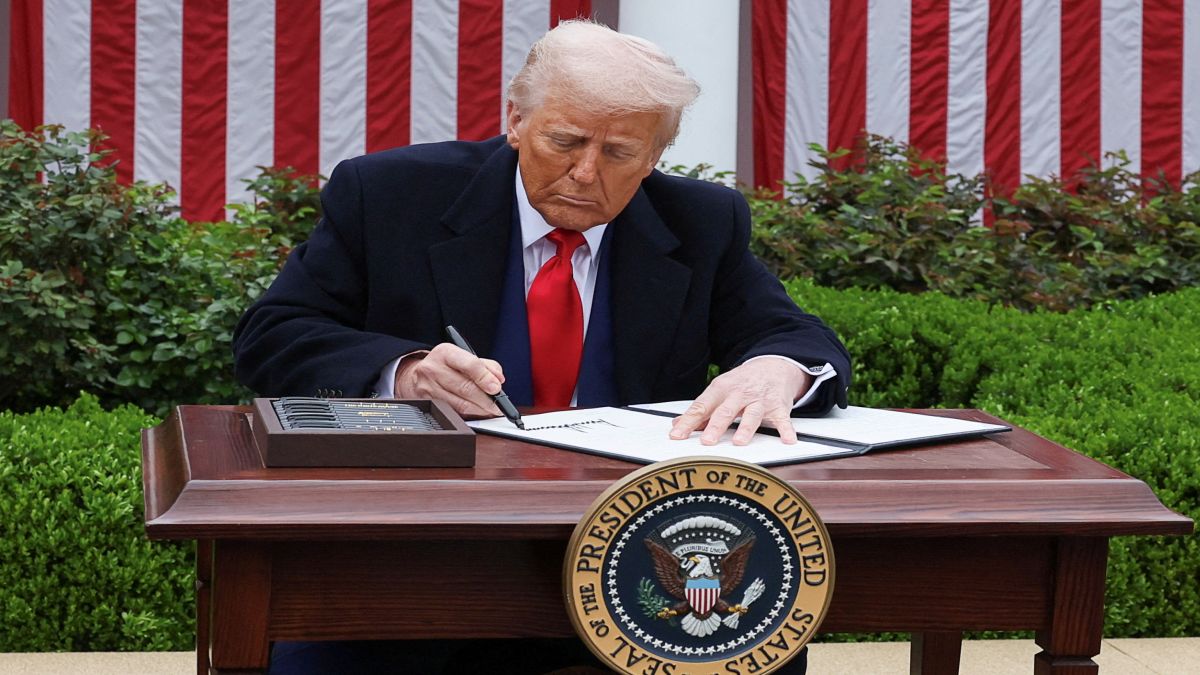As Israeli Prime Minister Benjamin Netanyahu pushes for the full military occupation of Gaza, President Donald Trump has avoided taking a definitive position, stating that the decision is “pretty much up to Israel.” His comments, made during a time of rising conflict, global criticism and a deepening humanitarian crisis in the area, show his administration’s effort to balance diplomacy with political strategy in a tense region.
Focus on humanitarian aid, not strategy
During a press interaction, Trump was asked whether he supported the possibility of Israel reoccupying the entire Gaza Strip—a scenario reportedly being considered by Netanyahu and his inner circle. Rather than addressing the question directly, Trump deflected, focussing instead on US efforts to deliver humanitarian aid. He emphasised the urgency of addressing hunger in Gaza, referencing a $60 million US aid package intended to support food distribution.
Trump said that Israel, along with Arab states, would be assisting in both the financing and logistics of food aid, though he offered no concrete details.
Netanyahu’s push for full occupation
Trump’s remarks come as reports surface suggesting Netanyahu is leaning toward a full military takeover of Gaza. According to Israeli media and officials cited by The Independent, Netanyahu met with senior security figures to discuss extending Israel Defence Forces (IDF) control over the entire enclave. Military Chief of Staff Eyal Zamir presented various strategic options for expanding the ongoing campaign, though final decisions had not yet been publicly confirmed.
This strategic shift, if implemented, would mark a dramatic escalation and possibly the reversal of Israel’s 2005 disengagement from Gaza, when it withdrew settlers and military personnel while maintaining control of the territory’s borders.
Mounting internal and external criticism
Despite Netanyahu’s hardline approach, his proposal faces considerable backlash—even from within Israel. Former heads of Israeli security agencies, including Shin Bet and Mossad, have warned that the idea of total occupation is both unrealistic and dangerous. Yoram Cohen, former chief of Shin Bet, described the plan as “a fantasy,” arguing that it is impossible to eliminate every militant while simultaneously ensuring the safe return of hostages.
There are also reports of friction between Netanyahu and top military officials, including Zamir, with some in the military wary of escalating operations while many soldiers are fatigued and the fate of hostages remains uncertain. A source cited by The Independent noted that the IDF is already in control of about 75 per cent of Gaza but faces dwindling morale and increasing casualties.
Hostage crisis and international pressure
The hostage situation remains one of the central challenges of the war. Since the October 7, 2023 Hamas-led attack, which saw 251 individuals abducted, Israel believes 59 remain captive, with at least 35 feared dead. Recent Hamas-released videos of emaciated hostages, allegedly due to Israel’s blockade of humanitarian aid, have further inflamed public opinion both inside and outside Israel.
These disturbing images sparked mass protests in Tel Aviv and Jerusalem, with demonstrators demanding urgent action to bring the hostages home and end the war. International leaders have echoed these concerns, calling for a renewed push toward ceasefire negotiations.
Impact Shorts
View AllTrump’s prior Gaza proposal
Earlier in the conflict, Trump himself floated the controversial idea of a US takeover of Gaza—a suggestion widely condemned globally. That proposal has since faded from political discourse, but Trump’s current stance—highlighting aid over strategy—seems designed to avoid reigniting similar backlash.
Trump’s hands-off position may reflect a calculated effort to maintain relations with Israel’s leadership while not appearing to endorse a prolonged war effort. His emphasis on humanitarian concerns—specifically food insecurity—also serves to position the US as a moral actor amid a mounting humanitarian disaster.
Gaza in ruins and starvation on the rise
Meanwhile, the humanitarian situation in Gaza continues to deteriorate. According to Reuters, approximately 60 per cent of the Strip’s buildings have been damaged or destroyed. A UN-backed food security agency warns that famine conditions are becoming a grim reality. Trump himself has acknowledged “real starvation” in the region, declaring the images coming out of Gaza to be undeniable.
Yet Israel maintains that there are no restrictions on humanitarian aid and places the blame on Hamas for the suffering. However, reports from Jordan indicate that warehouses full of aid have remained undelivered due to Israeli blockades reimposed in March.
UN Special Rapporteur Michael Fakhri has strongly condemned the situation, accusing Israel of deliberately engineering starvation. In an interview with The Guardian, Fakhri described the Israeli military strategy as “a crime against humanity,” stating that the starvation campaign was meticulously designed.
Political stakes for Netanyahu
Netanyahu is under pressure from the far-right factions within his coalition, some of whom are advocating for the reestablishment of Jewish settlements in Gaza. Finance Minister Bezalel Smotrich has claimed that such plans are no longer hypothetical but actionable. The reoccupation of Gaza would not only be a strategic shift but also a symbolic victory for right-wing settlers who have long opposed the 2005 disengagement.
One Israeli source told The Independent that the conflict has become a means of political survival for cNetanyahu, noting that the public and military are exhausted and sceptical of further escalation.
What lies ahead
As the crisis deepens, the international community continues to push for a negotiated settlement. The US remains engaged in indirect diplomacy, though ceasefire talks recently stalled after Hamas responded unfavourably to a proposed deal involving a 60-day truce and phased release of hostages.
Trump’s insistence that the decision to occupy Gaza lies solely with Israel distances his administration from direct responsibility for the war’s trajectory, even as it remains deeply involved in humanitarian and diplomatic efforts. Whether this hands-off approach will prove effective—or morally defensible—remains to be seen as the human cost of the conflict continues to mount.
)